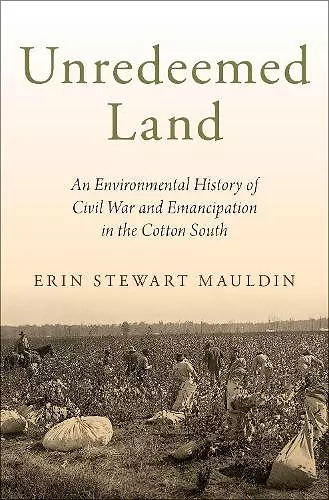Unredeemed Land
An Environmental History of Civil War and Emancipation in the Cotton South
Format:Hardback
Publisher:Oxford University Press Inc
Published:29th Nov '18
Currently unavailable, and unfortunately no date known when it will be back
This hardback is available in another edition too:
- Paperback£23.49(9780197563441)

How did the Civil War and the emancipation of the South's four million slaves reconfigure the natural landscape and the farming economy dependent upon it? An innovative reconsideration of the Civil War's role in southern history, Unredeemed Land uncovers the environmental constraints that shaped the rural South's transition to capitalism during the late nineteenth century. Dixie's "King Cotton" required extensive land use techniques, fresh soil, and slave-based agriculture in order to remain profitable. But wartime destruction and the rise of the contract labor system closed off those possibilities and necessitated increasingly intensive cultivation in ways that worked against the environment. The resulting disconnect between farmers' use of the land and what the natural environment could support went hand-in-hand with the economic dislocation of freedpeople, poor farmers, and sharecroppers. Erin Stewart Mauldin demonstrates how the Civil War and emancipation accelerated ongoing ecological change in ways that hastened the postbellum collapse of the region's subsistence economy, encouraged the expansion of cotton production, and ultimately kept cotton farmers trapped in a cycle of debt and tenancy. The first environmental history to bridge the antebellum, Civil War, and Reconstruction periods, this work will appeal to anyone who is interested in the landscape of the South or the legacies of the Civil War.
Mauldin's well-researched book investigates the fascinating story of land in the Cotton South and how it was farmed in the years from 1840 to the 1880s, offering a new agricultural and environmental history of the Civil War and emancipation.... Unredeemed Land argue[s] for the vibrant possibilities of analyzing the environmental impacts of the Civil War—and other major conflicts—on the daily life and material futures of communities and individuals. * Sarah Anne Carter, American Historical Review *
In Unredeemed Land, Mauldin has written a thoughtful and engaging examination of southern environmental history stretching from the antebellum era through the Civil War and into Reconstruction. Unredeemed Land illuminates a frequently neglected area of study. Mauldin also demonstrates that policies promoting environmental protection need not be limited to affluent nations operating under strong economic conditions. Denizens who ignore sustainable environmental practices do so at their peril. * J. Michael Martinez, The American Historian *
Erin Stewart Mauldin has written a succinct and insightful analysis of southern agriculture that explodes old myths and offers new explanations by taking an environmentally holistic view of the subject...This brief but incisive book will be of interest to anyone who wants to understand how the Old South attempted to become the New South, with all the attendant challenges and setbacks of such a fundamental adjustment. It adroitly explains why such a transition was wrought with failures and limitations. * Daniel McCool, Journal of American History *
Unredeemed Land is a welcome intervention in Civil War and Reconstruction historiography, demonstrating the critical role of environmental fragility in rural Southern life ... an impressive piece of scholarship * Samuel Watts, Australasian Journal of American History *
In Unredeemed Land, Mauldin has written a thoughtful and engaging examination of southern environmental history stretching from the antebellum era through the Civil War and into Reconstruction. So many histories of the era focus on political, military, and socioeconomic events, and rightly so. Yet in reading these sweeping histories, there is a tendency to think that ordinary citizens reflected on the monumental issues of the daywhen, in fact, most people worried far more about earning a living and feeding their families. Byexamin[ing] the factors that affected the day-to-day lives of farmers,Unredeemed Landilluminates a frequently neglected area of study. Mauldin also demonstrates that policies promoting environmental protection need not be limited to affluent nations operating under strong economic conditions. * J. Michael Martinez, The American Historian *
Unredeemed Land adds an important new chapter to the expanding historiography of southern environmental history. Mauldin's work goes far in helping to explain why southern farmers and planters would have embraced a postwar system of intensive cotton production that proved to be so detrimental to the land and its people ... [The book] serves as an important introduction to the American Civil War's devastating ecological legacy. * Justin C. Eaddy, North Carolina Historical Review *
Mauldin should be applauded for the amount of primary research she did. By utilizing a number of letters and journals, she provides a human element to the story of economic and environmental change. Mauldin also deserves credit for writing a highly readable book about a complex subject. Even when dealing with subjects such as ecology and socioeconomic factors of the time period, the writing and sources make for a fascinating read. * Thomas Robinson, Museum of Florida History, H-Net reviews *
[Amidst] the sesquicentennial of the Civil War ... Mauldin still found fresh soil to till ... in considering the impact of the war on land usage. ... She does a commendable job humanizing a potentially dry topic; her prose is lively, and she combines personalized accounts and moving journal entries with obligatory census data and government records. ... Essential. * CHOICE *
- Winner of A ^IChoice^R Outstanding Academic Title Winner of the Wiley-Silver Book Prize of the Center for Civil War Research.
ISBN: 9780190865177
Dimensions: 157mm x 236mm x 25mm
Weight: 599g
256 pages